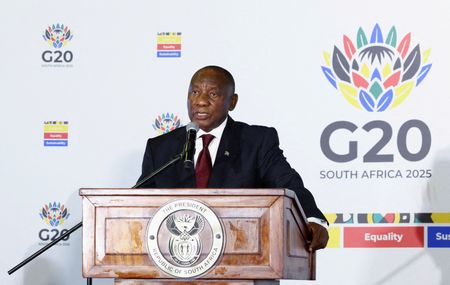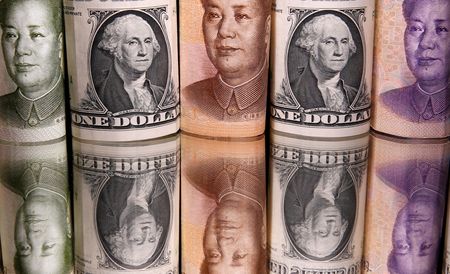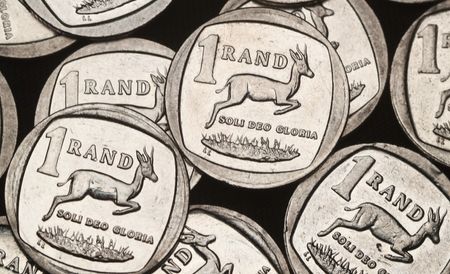By Anjana Anil and Emily Chow
SINGAPORE (Reuters) -Oil prices reversed early gains and fell on Tuesday amid uncertainty about trade tensions between the U.S. and China, the world’s top two economies, which could weigh on global fuel demand.
Brent crude futures slipped 28 cents, or 0.4%, to $63.04 a barrel by 0630 GMT, while U.S. West Texas Intermediate crude was at $59.26, down 23 cents, or 0.4%.
In the previous session, Brent settled 0.9% higher, and U.S. WTI closed up 1%.
“While working-level talks between two sides continue, the Chinese side has vowed a ‘fight to the end’, if there’s a fight. Oil markets will be sensitive to such rhetoric emanating from either camp, though we expect the price movements to remain rather rangebound in the near term,” said Suvro Sarkar, energy sector team lead at DBS Bank.
U.S. Treasury Secretary Scott Bessent said on Monday that President Donald Trump remains committed to meeting Chinese President Xi Jinping in South Korea this month, as both countries try to defuse tension over tariff threats and export controls.
However, developments last week, such as Beijing’s expanded export controls on rare earths and Trump’s threats of 100% tariffs and software export curbs from November 1, have weighed on sentiment.
On Tuesday, Beijing also announced sanctions against five U.S.-linked subsidiaries of South Korean shipbuilder Hanwha Ocean, while the U.S. and China will begin charging additional port fees on ocean shipping firms that move everything from holiday toys to crude oil.
Earlier, Trump had also cast doubt on prospects for a meeting with Xi during the Asia-Pacific Economic Cooperation (APEC) summit in South Korea set for October 30 and November 1, saying on Truth Social, “Now there seems to be no reason to do so.”
Front-month U.S. crude oil futures ended Monday’s trading at their smallest premium since January 2024 over the seventh-month contract, as OPEC+ ramps up supply while seasonal refinery maintenance in the U.S. pressures demand for prompt barrels.
Narrowing backwardation, the market term for immediate deliveries fetching a premium over later deliveries, suggests investors are making less money selling their oil in the spot market because near-term supply is perceived to be ample.
In its monthly report on Monday, the Organization of the Petroleum Exporting Countries, and allies including Russia, said the oil market’s supply shortfall would shrink in 2026, as the wider OPEC+ alliance proceeds with planned output increases.
(Reporting by Anjana Anil in Bengaluru and Emily Chow in Singapore; Editing by Jacqueline Wong, Clarence Fernandez and Kim Coghill)











